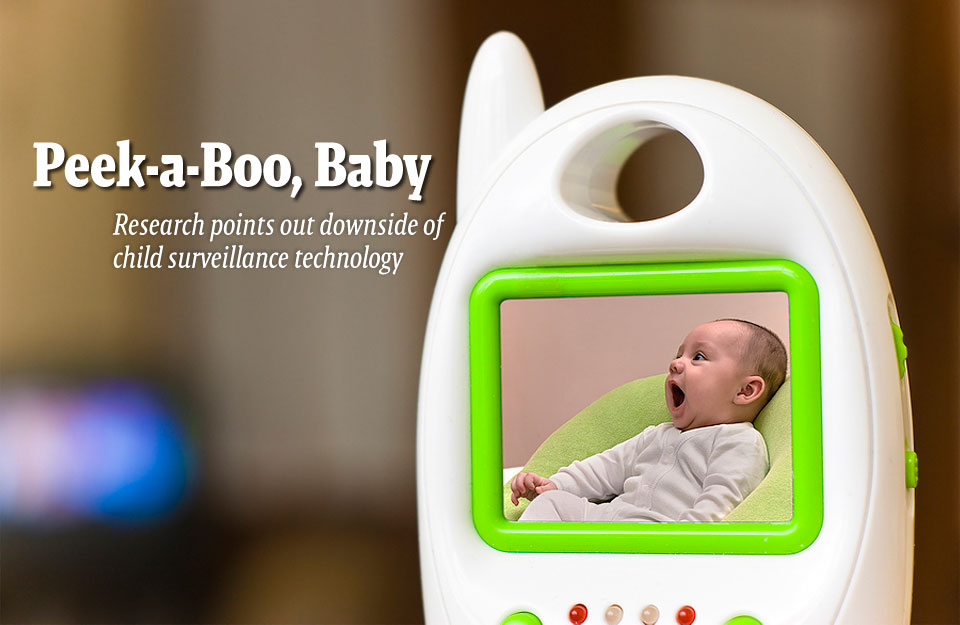-
Page Navigation Links:
- Skip to Site Navigation Links
- Skip to Features

- The University of Iowa
- Spectator
- Monthly News for UI Alumni and Friends
A baby monitor can be reassuring for parents, who know that they’ll be summoned if the little one is in need. Of course, the devices have also caused parents to lose sleep as they panic over a peep or sweat the silence.
Perry Howell, a University of Iowa graduate student in communication studies, is researching how child surveillance technologies hold the promise of reducing parental angst, but may have the opposite effect.
Howell, a licensed clinical psychologist, points out that the use of fetal ultrasound, pregnancy advice books, and baby monitors has increased since the 1980s, a time when parents began to view the world as more dangerous. As the desire to monitor and protect children intensified, studies have consistently revealed that American moms and dads are more anxious about and dissatisfied with the parental role than ever.
“Many parents I interviewed acknowledged their overprotectiveness, and the potential for that nervousness to rub off on the kids,” says Howell, a recipient of the Ballard-Seashore Fellowship. “They wanted to relax and not worry so much, in part so their kids would feel more comfortable in the world. Several parents, myself included, recognized that we are more uptight than our own parents were, even though the world is arguably safer. But even though we’re all aware of it, we can’t seem to stop.”
Illusions of safety
Howell examined reactions to the best-selling pregnancy guide, What to Expect When You’re Expecting. Previous books about pregnancy were organized like encyclopedias, so mothers could reference them if a specific concern came up. What to Expect was the first pregnancy book to take the month-by-month approach, which Howell describes as a method of self-monitoring.
“In the first edition, in 1984, the authors stated that their intent was to help mothers feel empowered and informed, so expectant moms could understand their bodily sensations rather than feeling like helpless vessels,” Howell says. “If you look at reviews on Amazon, a lot of people love the book for that reason, but it also gets criticized for being too intense and for pointing out every little thing that could go wrong. People say things like, ‘Avoid this book at all costs. It’ll make you a neurotic mess throughout your entire pregnancy.’”
Likewise, an all’s-well ultrasound can be a tremendous relief for parents. But if a problem is spotted, parents may feel responsible even if they did nothing to cause it and have no power to change the outcome.
“People are attracted to surveillance because they believe it can help them better protect the child, but a lot of that is an illusion,” Howell says. “Sure, you see more, but your actual ability to do much intervening can be quite limited. You may be exposed to knowledge you can’t do much with, and then end up feeling helpless.”
Howell argues that baby monitors reinforce the notion that parents should never relax because the child could be at risk at any moment—but that parents can do the watching without missing a beat.
“There’s some evidence that increased surveillance is a result of lessening parental interest in children—that despite their desire to protect the children, parents are increasingly tempted to let technology do some of the work,” Howell says. “Part of this trend is that American parents are reluctant to give up non-parenting activities when they have kids, and baby monitors are available as an efficient, pro-multitasking technology.”
A personal choice
Several parents Howell interviewed concluded that monitors weren’t effective because they could hear the baby without one, because of the anxiety it caused, or because it picked up the wrong signal. In one case, a video monitor picked up a feed of an astronaut in outer space; in others, babies used monitors to make their parents magically appear. Still, none of the parents were willing to advise against using a monitor.
“It tends to be an individual decision, and something you have to figure out on your own,” Howell says. “My wife and I used a baby monitor in a three-room house, then realized it was unnecessary. With each of these technologies, people are generally willing to give it a shot and put up with some anxiety if there’s even one-millionth of a chance it could save their child.”
Howell isn’t suggesting that parents boycott surveillance technologies or quit worrying about their kids. In his years as a family therapist, he worked with a broad range of parents—including some who didn’t pay enough attention to their children. He does encourage parents to consider whether their concerns about the world’s risks are reasonable, and whether various surveillance technologies are helping or causing more worry.
“Many times parenthood makes you anxious, and many times you should be,” Howell says. “But if that’s coloring your feelings about parenthood, or if you notice your child adopting a risk-averse way of looking at the world that could interfere with other important values like innovation, discovery, and adventure, you should look at whether you’re going overboard.”
—Nicole Riehl
photo supplied by BigStock
© The University of Iowa 2009
